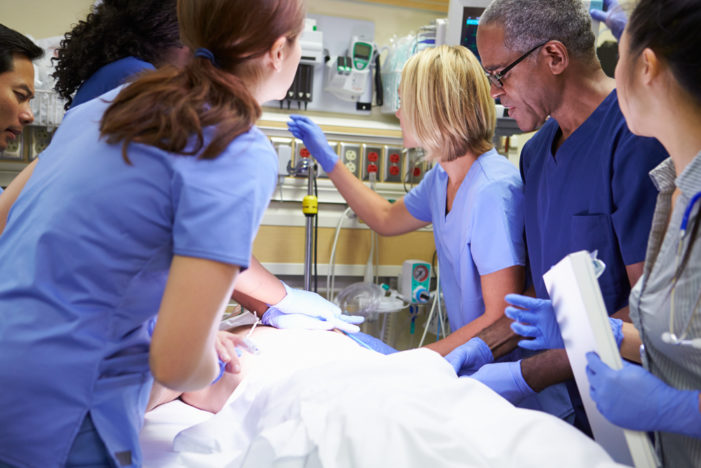In just over one month, our City has undergone a cataclysmic transformation. The disease caused by the novel coronavirus, known as COVID-19, has wreaked utter devastation upon the social and economic order of this vibrant City, and will cost thousands of lives before it is quashed. Like you, we did not imagine any of this at the start of the year. Like you, we grieve the destruction COVID-19 has caused in our lives. Like you, we wake up wishing it will end soon—and wondering when life will return to normal.
Our fellow New Yorkers, these are not normal times. They are, instead, times filled with uncertainty, pressure, loss, and stress. But they are also times of unity and of commitment to the public good. As New Yorkers, we have and always will come together to sacrifice for each other, triumph over adversity and overcome even the greatest losses. We have done it before, and we will do it again. But we need everyone’s help. As representatives of our City’s Emergency Departments, along with many hundreds of our colleagues across the state who are working tirelessly to save lives, we want to impress upon each
of you what this pandemic truly looks like on the frontline, and what you can do to help our City.
1. This disease spreads more easily than we initially knew. COVID-19 can infect anyone. You may not know you have COVID-19, but you can still spread the virus. Many who are infected only feel very mild or no symptoms.
2. Stay home, even if you do not feel sick. If you must leave home, protect yourself and others. Practice physical distancing – maintain at least 6 feet of distance between you and others. Wear a face covering (any well-secured paper or cloth that covers your mouth and nose), do not touch your face with unwashed hands, and wash your hands often with soap and water for at least 20 seconds.
3. The symptoms of COVID-19 can feel like the flu, and symptoms can be variable. When people get sick with COVID-19, they can expect symptoms that might include fever, chills, cough, shortness of breath, sore throat, loss of smell or taste, headache, nausea, diarrhea, abdominal upset, and other flu-like symptoms. Not everyone has exactly the same symptoms, but most people will fully recover within days to weeks.
4. If you feel sick, you need to self-isolate and stay home. If you feel any symptoms, immediately isolate yourself from others! Protect your friends and family; stay by yourself, eat alone, use a separate bathroom (or clean after each use), and avoid touching the same objects (e.g., refrigerator, remote)—or use gloves if you do. Cover your mouth and nose with a tissue or your sleeve when sneezing or coughing. Do not use your hands to cover your sneeze or cough. Immediately throw out tissues and wash your hands afterward. Wear a face covering if you cannot maintain at least 6 feet of distance from others. Do not leave your home unless you need medical care.
5. Take care of yourself and stay in touch with your doctor. Most people who have COVID-19 experience mild symptoms and can safely recover at home. Take acetaminophen (Tylenol), ibuprofen, or other fever-reducing medicine, get rest, and drink lots of fluids. If you have any of the symptoms described above, assume that you have COVID-19. Going outside to obtain a COVID-19 test is not necessary; it only exposes others to the illness. If you are 50 years of age or older or have an underlying health condition (including lung disease, moderate to severe asthma, heart disease, a weakened immune system, obesity, diabetes, kidney disease liver disease, or cancer), call your doctor. They may want to monitor you more closely. If you do not have a doctor call 311.
6. Watch for warning signs. If your symptoms get worse or do not go away after three to four days, consult with your doctor. Call, text or use your patient portal before visiting your provider. Use telemedicine instead of an in-person medical visit, if possible. Go to the emergency room if you develop any of the following severe symptoms: trouble breathing, chest pain, new confusion or the inability to stay awake, bluish lips or face, fainting, feeling winded when talking or walking short distances, or have severe weakness. This list is not all inclusive. Call 911 if you need help right away.
7. Self-isolation is hard, but temporary—and it can save lives. If you had or may have had COVID-19, you can leave your home when all the following are true:
• It has been at least seven days since your symptoms started.
• You never had fever OR you have not had a fever for the prior three days without use of fever-reducing drugs such as Tylenol or ibuprofen.
• Your overall illness has improved.
Remember, even when you feel better, stay home as much as possible and only go out for essential supplies like groceries. This type of isolation is difficult, but we assure you it will save others. Don’t cut corners.
Many of you have taken the steps above to protect yourself and others and we thank you. You are literally saving lives. But many of you have not—or continue to cut corners. This virus does not respect what we do “most of the time.” Fellow New Yorkers, we need to do more!
Every day, our emergency departments are overflowing with patients newly infected with COVID-19, many starving for oxygen and on the brink of death. Many are older, but some are young. Many have preexisting medical problems, but some do not. While we’re constantly searching for new treatments and better ways to care for our patients, too many are dying despite our best efforts. These patients are also our friends, families, and colleagues. We grieve for them, even as we care for them. It is difficult work, but it is our job. The hardest part about it, truthfully, is that we have no control over stopping the spread. That’s where you come in, New York.
Make no mistake. This disease spreads silently, but it kills mercilessly. Even as we help you, we need you all to help us. Stay home, wash your hands, stay smart, stay on your guard. Protect your fellow New Yorkers. Call your doctor or 311 if you have questions about COVID-19, and only if you feel very sick, come see us in the ER. We are here for you, doing our part. Thank you for doing yours.
Stay well, NYC!
The above Open Letter to New Yorkers regarding COVID-19 has been signed by nearly 50 emergency room physicians from hospitals and health systems across the City.
They have posted it on Change.org to secure even more signatures.
Here’s the link: http://chng.it/TwvhM5QzZw.

